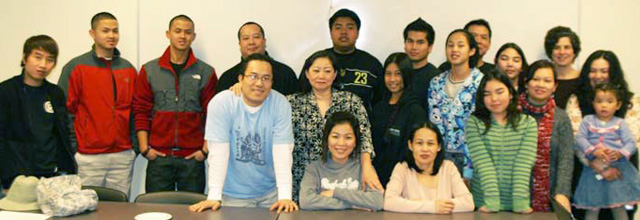
Clip from Interview with Melanie Lim
Files
Description
An excerpt from a video interview with Melanie Lim, part of the Cambodian American Community of Oregon's oral history project documenting the experiences of survivors of the Cambodian genocide of 1975-1979.
Interview by Lauro Lim, 29 May 2009.
Rights
This digital access copy is made available as streaming media for personal, educational, and non-commercial use within the parameters of "fair use" as defined under U.S. Copyright law. It cannot be reproduced, distributed, or screened for commercial purposes. For more information, please contact Special Collections at Portland State University Library at: specialcollections@pdx.edu or (503) 725-9883.
Subjects
Oral histories, Cambodia -- Politics and government -- 1975-1979, Political atrocities -- Cambodia
Publication Date
5-29-2009
Disciplines
Asian History | Social History
Persistent Identifier
http://archives.pdx.edu/ds/psu/12691
Recommended Citation
Lim, Lauro, "Clip from Interview with Melanie Lim" (2009). Oral History Interviews. 2.
http://archives.pdx.edu/ds/psu/12691




Comments
Melanie Lim
Interviewed by Lauro Lim, 29 May 2009
Transcribed by Patricia Schechter, 5 September 2014
Clip: 22:47-27:23
What was the most disturbing thing that you witnessed?
When I was in the mobile team in 1977, when they started killing people, like soldiers or teachers, or government workers, or students. I saw them tie up a family in a line, even the little ones; they tied them up too. I saw them walk on the street with a ghost face on their face already. It seemed like they knew what was going to happen to them. They couldn’t cry anymore, I don’t think they could cry anymore, besides that sad face. I walked by and I couldn’t even look at them. I barely looked at them because when I looked at them I felt like I saw a ghost walking alive. And I can’t imagine that until they told me about my parents, too, before they brought them to be killed. They did the same things that they did to those people that they tied up on the rope. They beat them up so badly before they are killed.
Punishments? You name it. If you steal a little thing, they kill you too. I never knew but one time there was one boy—I didn’t know them but we came together from different villages in the mobile team – and he stole some food from me. [heavy sigh] He was about 2 or 3 years older than me. When I saw him, I woke up at midnight and I saw him. He was where I sleep. I saw he had my rice in his hand and I yelled so loud. The Khmer Rouge soldier, they took him and they beat him up only a little bit away from where I sleep but I could hear him. He was yelling for help and everything. And I felt so terrified. I never knew that for stealing a little bit, that that boy was killed that day. They beat him until he died. I feel so bad about that. If I knew that, I would not have said anything – I would just tell him go away, don’t take my food but I never knew that they got punishment simply because of stealing food. It was the death penalty. Everything was zero tolerance. If you make one mistake you are dead.
I never thought I could see the sky or the bright light. Everyday in my life at that time, for three years and 8 months, it was a dark day. Like living hell. And I never knew when it was going to move on or what would happen or when I would see the sunlight. Never think of it. I was hopeless. Hopeless. Especially when I knew that my parents and brothers were taken away and got killed. So I said, what was the point for me to live? I don’t want to live anymore. There was no meaning for me to live by myself. I just wanted to end it like them, too. I don’t know why they didn’t kill me at that time. They were still keeping me and using me in the mobile team. Even though I was sick and lying down on the ground. They still didn’t kill me, too.